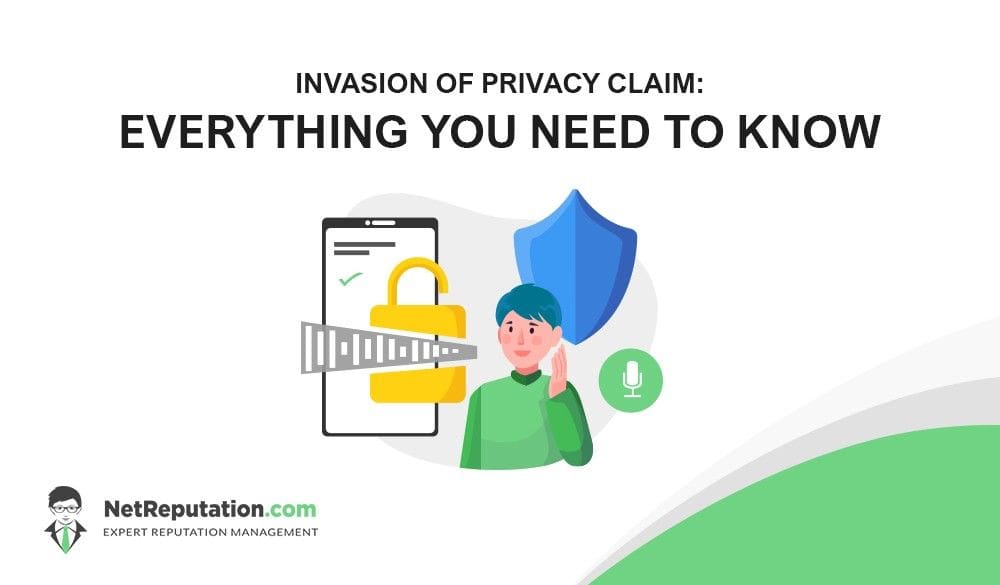What is an invasion of privacy claim?
Invasion of privacy claims refer to legal actions taken by individuals who believe that their privacy has been violated.
Invasion of privacy claims can be complex and can involve a range of legal and ethical considerations, and they often involve balancing the rights of individuals to privacy against the public’s right to know.
Understanding the basics of invasion of privacy claims is important for anyone who wants to protect their personal information and privacy rights. Our guide will provide essential details you’ll need to protect your privacy and your online reputation.
Get started with your free internet privacy consultation
Invasion of Privacy
The term “invasion of privacy” refers to violations of personal or professional privacy and may include a range of actions, such as the unauthorized use of personal information or images, surveillance or stalking, or the public disclosure of private facts.
It is our experience that when exploring invasion of privacy – and invasion of privacy claims – several key questions arise:
What Are Some Examples of Invasion Of Privacy?
There are several examples of invasion of privacy, which include:
- Public disclosure of private information: This occurs when someone publicly shares private information about an individual without their consent, such as medical or financial information.
- Intrusion into private affairs: This occurs when someone interferes with an individual’s private activities, such as by spying or eavesdropping on them.
- False light: This occurs when someone portrays an individual in a false or misleading manner that is offensive to the individual’s reputation or privacy.
- Misuse of likeness: This occurs when someone uses an individual’s name or image without their consent, such as in advertisements or commercial products.
- Stalking or harassment: This occurs when someone repeatedly follows or contacts an individual in a manner that causes them fear or distress.
Clearly, invasion of privacy can take many different forms, and it is important for individuals to be aware of their rights and take steps to protect their personal information and privacy.
Can I Sue Someone for Invasion of Privacy?
If you’ve ever asked, “what is an invasion of privacy claim?” this section can help you gain a better understanding.
If you believe that your privacy has been violated, you can file an invasion of privacy claim. However, the specific legal requirements for an invasion of privacy claim can vary depending on the jurisdiction and the nature of the claim.
To successfully sue someone for invasion of privacy, you would generally need to demonstrate that the person’s actions were intentional, that you had a reasonable expectation of privacy, and that their actions caused you harm or damages. Depending on the type of invasion of privacy claim, you may also need to show that the person’s actions were highly offensive, that they acted with malice, or that they breached a duty of confidentiality.
What Remedies Are Available for Invasion of Privacy?
There are several remedies available for invasion of privacy, which may include:
- Injunctive relief: This is a court order that prohibits the defendant from continuing to engage in the invasion of privacy. For example, the defendant may be ordered to stop publishing private information about the plaintiff.
- Monetary damages: The plaintiff may be awarded monetary damages to compensate them for any harm or losses they have suffered as a result of the invasion of privacy. This can include damages for emotional distress, loss of reputation, or economic harm.
- Punitive damages: In some cases, the plaintiff may be awarded punitive damages to punish the defendant for their wrongful conduct and to deter similar conduct in the future.
- Corrective action: The defendant may be required to take corrective action to remedy the harm caused by the invasion of privacy, such as issuing a public apology or retracting false statements.
The specific remedies available for invasion of privacy can vary depending on the nature of the claim and the jurisdiction in which it is brought.

What Is an Invasion of Privacy Claim?
Invasion of privacy claims are a complex aspect of privacy law. In our experience, here are some of the most common types of such claims with a bit of background information on each:
Intrusion of Solitude
Invasion of solitude, also known as intrusion upon seclusion, is a type of invasion of privacy claim that involves a deliberate intrusion into an individual’s private affairs or seclusion. This can include situations where someone physically intrudes into an individual’s private space, such as by breaking into their home or office, or where someone uses electronic means to intrude into an individual’s private communications or information.
To successfully make an intrusion of solitude claim, the plaintiff must generally demonstrate that they had a reasonable expectation of privacy in the area or communication that was intruded upon, and that the intrusion was highly offensive to a reasonable person. This type of invasion of privacy claim can be particularly relevant in cases involving electronic surveillance, such as hacking or unauthorized access to personal devices or accounts.
Disclosure of Private Facts
Disclosure of private facts, also known as public disclosure of private facts, is a type of invasion of privacy claim that involves the public disclosure of private information about an individual. This can include information about an individual’s health, financial status, sexual activity, or other sensitive personal information.
To successfully make a disclosure of private facts claim, the plaintiff must generally demonstrate that the information disclosed was private and not of legitimate public concern, that the disclosure was highly offensive to a reasonable person, and that the disclosure caused the plaintiff harm or damages, such as emotional distress, loss of reputation, or economic harm.
This type of invasion of privacy claim can be particularly relevant in cases where sensitive personal information is disclosed without the individual’s consent, such as in cases of revenge porn or other types of non-consensual intimate image sharing.
False Light
False light is a type of invasion of privacy claim that involves the publication of false or misleading information about an individual that portrays them in a negative or defamatory way. This can include information that is taken out of context, altered or manipulated in some way, or presented in a misleading manner. For example, publishing an old mugshot as an attempt to defame someone’s character may be a false light claim.
False light claims can be particularly relevant in cases where false or misleading information is published about an individual in a way that could be detrimental to their personal or professional life and online reputation, such as in cases of defamation, libel, or slander.
Appropriation Of Name Or Likeness
Appropriation of name or likeness is a type of invasion of privacy claim that involves the unauthorized use of an individual’s name, image, or likeness for commercial or other purposes. This can include situations where an individual’s name or image is used in advertising, product endorsements, or other forms of marketing without their consent.
To successfully make an appropriation of name or likeness claim, the plaintiff must generally demonstrate that their name, image, or likeness was used without their consent, that the use was for commercial or other purposes, and that it caused the plaintiff harm or damages, such as loss of privacy or economic harm. Often, celebrities or other important figures (athletes, politicians, executives) are the targets of an appropriation of name or likeness.
This type of invasion of privacy claim can be particularly relevant in cases where an individual’s name or image is used without their consent for financial gain or other purposes. For example, if a company uses an individual’s image in an advertisement without their permission, the individual may have a claim for appropriation of their likeness.
What Are the Defenses Available for Invasion of Privacy Claims?
There are several defenses available for invasion of privacy claims, which may include:
- Consent: If the plaintiff consented to the publication or use of the private information, this can be a defense against an invasion of privacy claim.
- Public interest: If the information published or used was of legitimate public concern, such as in cases of news reporting or matters of public interest, this can be a defense against an invasion of privacy claim.
- Truth: If the information published or used was true, this can be a defense against false light or disclosure of private facts claims.
- Newsworthiness: If the information published or used was newsworthy, such as in cases of reporting on public figures or events, this can be a defense against an invasion of privacy claim.
- Privilege: In some cases, certain communications or information may be privileged, such as in cases of confidential communications between attorneys and clients, and this can be a defense against an invasion of privacy claim.
It’s important to note that the specific defenses available for invasion of privacy claims can vary depending on the nature of the claim and the jurisdiction in which it is brought.
If you believe that your privacy has been invaded and you are considering legal action, it’s important to consult with a qualified attorney who specializes in privacy law to understand the defenses that may apply in your specific case.

Key Takeaways
Invasion of privacy claims can be complex and can involve a range of legal and ethical considerations. They can encompass a variety of actions, such as the unauthorized use of personal information or images, surveillance or stalking, or the public disclosure of private facts.
Understanding the basics of “what is an invasion of privacy claim?” is important for anyone who wants to protect their personal information and privacy rights. With the right legal advice and remedies, individuals can take action to protect themselves from privacy violations and seek appropriate legal remedies.
Invasion of Privacy Claim FAQs
The internet privacy professionals at NetReputation receive numerous questions from clients about how to improve their digital privacy. Here are some of the most frequently-asked questions:
What are the consequences of invasion of privacy?
The consequences of invasion of privacy can be significant and can have both personal and professional impacts. Some of the consequences of invasion of privacy may include:
- Emotional distress: Invasion of privacy can cause significant emotional distress, anxiety, and mental anguish for the individual whose privacy has been invaded.
- Loss of reputation: Invasion of privacy can damage an individual’s reputation and cause harm to their personal or professional relationships.
- Economic harm: Invasion of privacy can result in economic harm, such as loss of business opportunities or income.
- Physical harm: In some cases, invasion of privacy can lead to physical harm, such as stalking or harassment.
- Legal consequences: Invasion of privacy can result in legal consequences, such as fines, damages, or criminal charges.
Invasion of privacy can have significant and far-reaching consequences, and it is important for individuals to take steps to protect their personal information and privacy rights.
What is the average settlement for an invasion of privacy?
There is no set or average monetary settlement for an invasion of privacy claim, as the amount of damages awarded can vary widely depending on a range of factors, such as the nature of the invasion of privacy, the severity of the harm caused, the legal remedy/remedies sought, and the jurisdiction in which the claim is brought.
In some cases, damages awarded for invasion of privacy claims may be relatively modest, while in other cases they can be quite substantial. Factors that can impact the amount of damages awarded can include the plaintiff’s emotional distress, loss of reputation, economic harm, and the defendant’s level of intent or malice.
Do I need a lawyer for help with an invasion of privacy claim?
While it is not always necessary to have a lawyer for an invasion of privacy claim, it is highly recommended. Invasion of privacy claims can be complex, and the legal requirements for proving a claim can vary depending on the jurisdiction and the specific circumstances of the case.
An experienced privacy lawyer can provide valuable guidance and support throughout the legal process, including:
- Evaluating the strength of your case: An attorney can help you determine whether you have a viable claim for invasion of privacy and the likelihood of success.
- Gathering evidence: An attorney can help you gather evidence to support your claim, such as documentation, witness statements, or expert testimony.
- Navigating the legal process: An attorney can help you navigate the legal process, including filing the necessary paperwork, attending court hearings, and negotiating with the opposing party.
- Pursuing legal remedies: An attorney can help you pursue the appropriate legal remedies for your claim, such as injunctive relief, monetary damages, or punitive damages.
Having an attorney to assist with claims is a valuable asset that can spell the difference between success and failure if you pursue a legal remedy.
Contact NetReputation Today
With identity theft and online harassment on the rise, protecting your digital privacy is more important than ever.
The loss or theft of personal information on the web can result in damage to your online reputation, not to mention potential financial, relationship, or employment issues.
At NetReputation, our team of internet privacy professionals provide a range of privacy-oriented services, including negative content removal, allowing you to take control of your data and to protect your digital reputation.
Call NetReputation today at 844-461-3632 or complete the form below to begin your free privacy evaluation.
